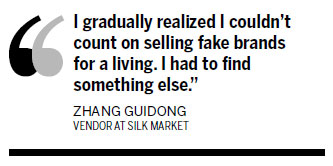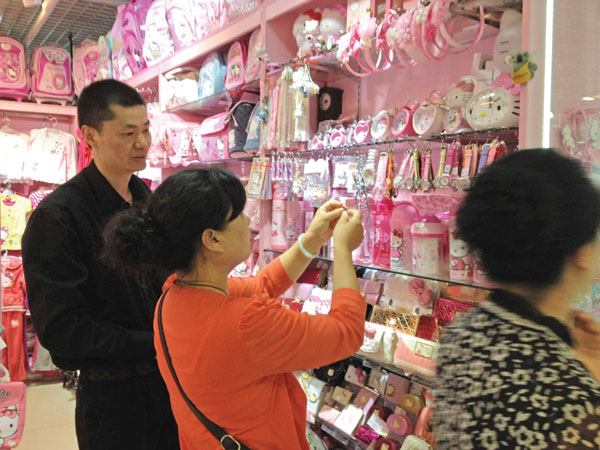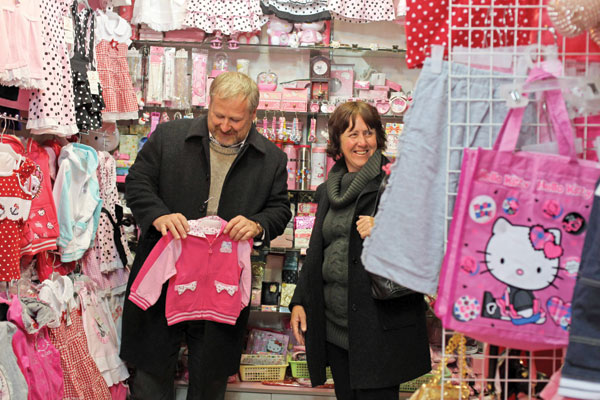Brakes on fakes
Updated: 2012-05-10 08:07
By Han Qiao (China Daily)
|
|||||||||||
|
|
|
|
 |
The Silk Market is cleaning house to sweep out counterfeits, and vendors are finding they must go legit to survive. Han Qiao from China Features reports in Beijing.
Zhang Guidong sold fake LV and Gucci bags for eight years in Beijing, until he decided it was time to go legit. Since 2005, the 43-year-old has instead run an authorized Hello Kitty store in the Silk Market, a shopping compound that lures foreign tourists with silk and foreign brand knockoffs.
His 13-square-meters pink shop is packed with bags, wallets and children's clothing, all of which sport Hello Kitty's face. The shop has recently been refurbished, as the Silk Market is undergoing a yearlong renovation.
The market's managers say the number of stalls will be cut in half by the project's end. Only vendors who sell authorized goods can bid for new stalls.
The kids' wear section was renovated last month. The new neighbor of the Japanese cat that occupies Zhang's shop is a British bear - specifically, Winnie the Pooh.
Zhang has managed to secure good profits by buying off-season items from suppliers at a 70-percent discount.
"They sell well here because customers are from all over the world and visit in all seasons," he says.
"The price is negotiable. I will sell, as long as my customers provide me a 10-percent profit. Often, my profits are much higher."
Zhang came to Beijing from a village in Anhui province in 1997 and started selling fake LV bags at the Silk Market that year.
"Every stall then carried virtually the same products - fake designer bags from such brands as Gucci, LV and Prada," he recalls.
Business was good. Zhang and his wife bought their first apartment in Beijing in 2002. The couple, who had a son, decided to have another child. Their daughter was born the following year.
But their business was interrupted in early 2005, when the market moved from an outdoor street to an actual building.
"The government suddenly got tough on knockoffs," Zhang recalls.
His stall was raided twice in the following months. He was fined 10,000 yuan (about $1,600) the first time and 30,000 yuan the second time. After the second raid, more than 10 vendors with larger stalls were evicted.
"We were playing a cat-and-mouse game with the government every day," Zhang recalls.
"I gradually realized I couldn't count on selling fake brands for a living. I had to find something else."
Zhang knew little about retailing anything other than fake designer bags. But he became intrigued after hearing so much about Hello Kitty.
"(Hello Kitty) is cute. It's a recognized brand," he says.
Zhang tested the waters by buying some knockoff Hello Kitty merchandise.
"Sales were OK," he says.
"Foreigners buy Hello Kitty, too."
But he got the cold shoulder when he visited the brand's regional office in Beijing.
The office told Zhang there was no point in speaking with him, because their products are meant for high-end shopping malls - not markets crammed with fake products.
Zhang wasn't discouraged.
He told them that if they didn't give him the products, he would keep selling knockoffs.
"The reason I was there was the market had pressured us to change," he says.
"They'd promised to protect these brands."
Zhang persuaded the Hello Kitty regional manager to visit the Silk Market to meet with the market's general manager. It took a few months before he finally won their trust and obtained authorization to sell Hello Kitty products.
Zhang ditched his knockoffs and opened his Hello Kitty store. The Silk Market's managers gave him a 50-percent rent discount, as promised. But Zhang found selling real merchandise to be more difficult than anticipated.
"I was bringing in only 100 yuan in profit a day, compared to the 1,000 to 2,000 yuan I was making with the knockoffs," he says.
"The idea of turning back haunted me often."
But Zhang's wife, Wu Hongcui, was hesitant to go back.
"I was worried about getting in bigger trouble," Wu, 41, recalls.
The couple heard about two people who had received three-year prison sentences for supplying fake LV bags to Silk Market vendors.
"We had no connections in Beijing," Wu says.
"We couldn't afford to take a risk like that."
Their daughter was then age 3 and their son was 14. Zhang says he and his wife love Beijing and want to spend the rest of their lives in the capital.
"We want a business that could last long and pass it down to our children, if possible."
Fortunately, their business gradually got better.
"Foreigners aren't too price-sensitive, and they love high-quality products," Zhang says.
He opened a second shop, which his son runs, in the Silk Market just one year after opening his first.
Ram, a Singaporean tourist who prefers to only provide his given name, says he appreciates the quality of the merchandise at Zhang's shop.
"I know this brand. It's of the same quality," he says, after selecting a bag for his daughter. After wheeling and dealing with Zhang, Ram scored the bag for 70 yuan.
"It's much cheaper than in Singapore," Ram says.
It has become increasingly difficult for foreign tourists like Ram to buy LV, Gucci and Prada knockoffs in the Silk Market.
Zhang's former "colleagues" continue to sell fake designer bags, but they have moved to underground parking lots.
They lead customers, mostly Chinese and some resident foreigners, to the parking lot and show them catalogues full of designer brands. After a customer shows interest in a particular bag, the vendor places a phone call to a co-worker and the bag arrives within minutes.
Zhang says the underground parking lot was packed with such vendors two years ago. But only around 10 of them remain.
"It's not easy to continue," he says.
"But they say they want to hang in there for as long as they can. They find it difficult to get an aboveground stall since the market's upgrade started."
Zhang doesn't make as much as he did selling counterfeits.
But he says he's satisfied with what he has - a 140-sq-m apartment, a Toyota SUV, a good wife and two lovely kids.
"When I look back at the days I spent growing crops and breeding fish in a small village 15 years ago, I feel lucky with what I have now," Zhang explains.
He pauses and jokes: "I started out breeding fish. Now, I sell cats."
Today's Top News
Rescuers race against time for quake victims
Telecom workers restore links
Coal mine blast kills 18 in Jilin
Intl scholarship puts China on the map
More bird flu patients discharged
Gold loses sheen, but still a safe bet
US 'turns blind eye to human rights'
Telecom workers restore links
Hot Topics
Lunar probe , China growth forecasts, Emission rules get tougher, China seen through 'colored lens', International board,
Editor's Picks

|

|

|

|

|

|







